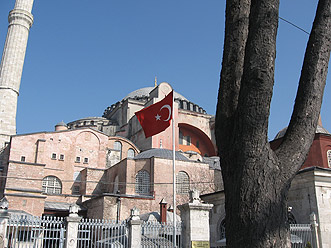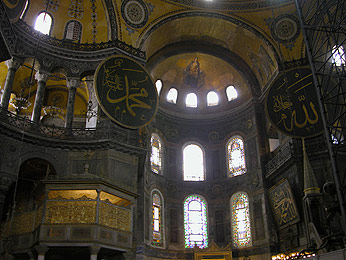Commentary to the Patriarch Bartholomeos’ Interview
(
28.11.2007
)

Our due respect notwithstanding, the last interview that the Patriarch of Constantinople Bartholomeos gave for the Bulgarian National Television, rightly causes certain dilemmas and necessitates a short commentary.
1. On one hand, to the journalist’s question of why the Patriarchate of Jerusalem is calling itself a mother Church, the patriarch remarks that this is nothing but poetic expression, while on the other hand he emphasizes it on a few occasions during the interview that it is exactly the Patriarchate of Constantinople which is mother Church to the Bulgarian Church (as it is to the other Churches which gained their independence from it—author’s note); so now another question arises: is the patriarch’s second statement only poetic expression as well or does he really think that?
Historically, after being sent from
2. In a portion of his interview the Patriarch states: “All of us, the Orthodox—since the Ecumenical Patriarchate was not the only one to partake in this dialogue, but all the Orthodox (which is not true that all of them—author’s note)—we share the opinion that, during the first millennium since the existence of the Church, when it was one, there existed a primacy of the Roman Bishop, the Pope. That, however, was a primacy of honor and love, and not a primacy of jurisdiction (real power) over the entire Christian Church. In other words, as we were taught by theology, this is the primacy of human law (but not Divine law), created by the necessity of the Church to have one head and one coordinating center”.
Two predicaments arise from this excerpt.
First, does he state the following deliberately: “to have one head and one coordinating center”, or did the term ‘head’ subconsciously slip from his mind? Because ‘head’ denotes one thing, while ‘coordinating center’ denotes something else altogether! The head of the Church is the Godman Christ, and the Church is His Body. The Bishops of the local Churches are in the place and shape of Christ. Coordinating center is a more appropriate term for Orthodox ecclesiology, where all the Bishops are equal among each other, and are only distinct from one another by the primacy of honor, which can appear on the basis of many things. The expression or the earthly institution ‘head’, in the context of the one Church, is more suitable for papocentric ecclesiology.
Second, the terms ‘Divine law’ and ‘human law’ have been introduced to us under the influence of Western scholastic theology. The former expression appeals to Monophysitism and Catholicism, whereas the latter appeals to Nestorianism and Protestantism. The first one is too rigid, while the other one is too elastic. In addition, given that it is man who appears as the interpreter of these terms in theology, very often, in the end, both from Divine and human law, idols are created which are very difficult to dispose of. Orthodox theology knows of nothing else but ‘Divine-human law’, there is not much room here for willful interpretation, but for life according to the Truth which is known by its fruit, that is to say, by the success of the mission. Behind a failed mission there always stands either wrong theology or poorly understood theology.
Both the theories, as absolutist, do not take into consideration the historical development and the pastoral exigencies of the Church. Thus, for instance, if one compares the Patriarchate of Constantinople to the Moscow Patriarchate, and their battle for the primacy of honor, any objective orthodox Christian would conclude that this primacy, for a long time now, belongs to the Russian Patriarch and that he de facto has it due to many reasons: the numerous faithful, the numerous Bishops, the freedom in decision-making, the independence from external factors and so forth. But, it is because of this idolatric relationship and the deceptively construed alleged ‘human law’, this primacy of honor, de jure, still belongs to the throne in Constantinople. The other Orthodox Churches acknowledge this primacy, some of poltroonery, some of ignorance, some of dependency, while others of deference for the overall good, namely, the unity of the Orthodox Church. Let us see for how much longer will all this function the way it did until now?
 3. Moreover the Patriarch states: “In an Orthodox sense and interpretation, Constantinople is a coordinating center of all Orthodoxy because of the unity of Orthodoxy. At the same time, Constantinople coordinates the dialogue with the other non-Orthodox churches in our time, convenes general assemblies which fall under the presidency of the Ecumenical Patriarch or one of his representatives. In other words, it is an institution with primacy, necessary for the functioning for the entire Orthodox Church. If, and when, with God’s help we reach an agreement with the Catholic Church, namely, about the meaning of the term ‘primacy’, as it was in during the first millennium, the Ecumenical Patriarchate will have no difficulty to acknowledge Rome as the first throne and take the second place, which it had prior to the schism”.
3. Moreover the Patriarch states: “In an Orthodox sense and interpretation, Constantinople is a coordinating center of all Orthodoxy because of the unity of Orthodoxy. At the same time, Constantinople coordinates the dialogue with the other non-Orthodox churches in our time, convenes general assemblies which fall under the presidency of the Ecumenical Patriarch or one of his representatives. In other words, it is an institution with primacy, necessary for the functioning for the entire Orthodox Church. If, and when, with God’s help we reach an agreement with the Catholic Church, namely, about the meaning of the term ‘primacy’, as it was in during the first millennium, the Ecumenical Patriarchate will have no difficulty to acknowledge Rome as the first throne and take the second place, which it had prior to the schism”.
As we, the Orthodox, know, the aim of this dialogue was not to bargain with the Roman Catholic Church over the meaning of the term ‘primacy’ and it is not a question of whether the Patriarchate of Constantinople will have a difficulty to recognize again Rome as the first throne and take the second place, which it had prior to the schism. The aim and meaning purpose of the dialogue is to have the words of our venerable father Georges Florovsky fulfilled: “The uniting of Christians means nothing else to me, but an ecumenical return to Orthodoxy", namely, the purpose of the dialogue is nothing else but the acknowledgment and acceptance of the true faith—Orthodoxy by the Roman Catholics; afterwards, all else will be easier. Certainly, with this statement of his, the Patriarch surely did not mean, or at least, did not say that if we agreed with the Roman Catholic Church on the meaning of the term ‘primacy’, we would be able to enter into liturgical communion with them, but still, this is worth pointing out.
4. Furthermore, the Patriarch asserts: “it is better that we are situated in a country where Orthodoxy is a minority, in Turkey, since, had we been in a different country, the Church of Constantinople—the Church of the first throne of Christianity would have been exposed to the danger of becoming a national Church”. If we could only be sarcastic for a moment and short—and this seems to be the only way to effectively answer this statement—we would say: No, the Church of the Patriarchate of Constantinople is not a national Church at all; see, among its faithful and Bishops not only are there Greeks, but also Turks in a proportionate measure, as well as people of different nationalities, just as there are Arab Bishops in the Patriarchate of Jerusalem and just as there are several million Copts in the Patriarchate of Alexandria. Lord, forgive us…!
The writings of professor Christos Giannaras are not true at all, which were being quoted by the Patriarch, that it was a privilege for the Church of Constantinople to be located on a territory of a non-Orthodox state, among an alien religion, because it would be easier from there to demonstrate its ecumenical character. We would accept that assertion if it referred to the beginning of the Church mission, but to bring one Church to such condition, to any spiritual person, is but a proof for the inexistence of the fruits of the Spirit in its ecclesial life and witnessing for its missionary failure. The same holds true for the missionary activities of any other Church, while the examples can be seen anywhere around us.
Incidentally, the Patriarch of Constantinople is as much “Ecumenical” as the Greek Archbishop (may the Lord deliver him consolation!) is of “all of Greece”, and as the other primates of the local Orthodox Churches add epithets to their title derived from the names of the regions over which their respective Church has jurisdiction.
5. Finally, we would like to comment on the account that the title “Ecumenical” for the Church of Constantinople has been used uninterruptedly since 4th century AD, that it has been succeeded throughout the centuries, that even Bartholomeos inherited it and that this will continue to unfold in the times to come. Where did he leave room in this statement for the historic development of the Church and for its pastoral needs which surely do change with time? This is the idolatrous relationship which we wrote about earlier and that is the answer to the question as to how does someone imagine the role of mother Church and the primacy of honor among the Orthodox. Honor is conceded, it even is an evangelical imperative, but power is hard to concede…
But, since it is clear to us what kind of centralist and absolutist tendencies “human authority” entails, our attention has been attracted to another dilemma: is the Patriarchate of Constantinople truly hoping that the dialogue with the Roman Catholic Church could bear genuine fruit or does it only use it as a smokescreen behind which it promotes and imposes its primacy of honor? Besides, it is easier afterwards for someone to unite two centers, instead of going through the trouble of uniting more than ten centers.
That the point is in the latter one in fact, we are more and more convinced also from the attitude of the Patriarchate of Constantinople toward the Russian Orthodox Church during the past several decades. To all of us that regularly follow these events it is clear that the Patriarchate of Constantinople is conducting a policy whose major goal is to isolate the Russian Orthodox Church to a greater degree from the other Orthodox Churches. It seems unnecessary to come up with examples, but bringing the Estonian Church to the dialogue in Ravenna, encouraging the activities that the Romanian Church is undertaking in Moldova, the recognition or non-recognition (depending on the interest) of the Churches that receive autonomy or autocephaly from the Russian Orthodox Church, the closest relationship with the Ukrainian Church of Filaret Denysenko, the creation of new Churches on a canonical territories of the Russian Orthodox Church and much more, would be just a few.
(from the editorial staff of the web site of the Macedonian Orthodox Church)
